A Comparative Analysis: Freire and Al-Farabi on Education
VerifiedAdded on 2021/02/16
|8
|2049
|104
Essay
AI Summary
This essay provides a comprehensive comparison and contrast of the educational philosophies of Paulo Freire and Al-Farabi. It begins by defining the philosophy and sociology of education, then delves into the core of the discussion by comparing their views on the goals and aims of education. The essay highlights their similarities, such as the importance of education in shaping individuals and its connection to politics and critical thinking, while also emphasizing their differences. Freire's 'banking model' critique and advocacy for problem-posing are contrasted with Al-Farabi's emphasis on acquiring values, skills, and knowledge to achieve individual and societal perfection. The essay further explores their opinions on what should be taught in schools, detailing Freire's student-centered, critical consciousness approach and Al-Farabi's emphasis on moral virtue, discipline, and the use of different teaching methods for various audiences. Ultimately, the essay concludes that, despite their differing approaches, both philosophers sought to create a perfect human being for society. It underscores the importance of critical thinking and the relevance of their ideas to contemporary educational practices.
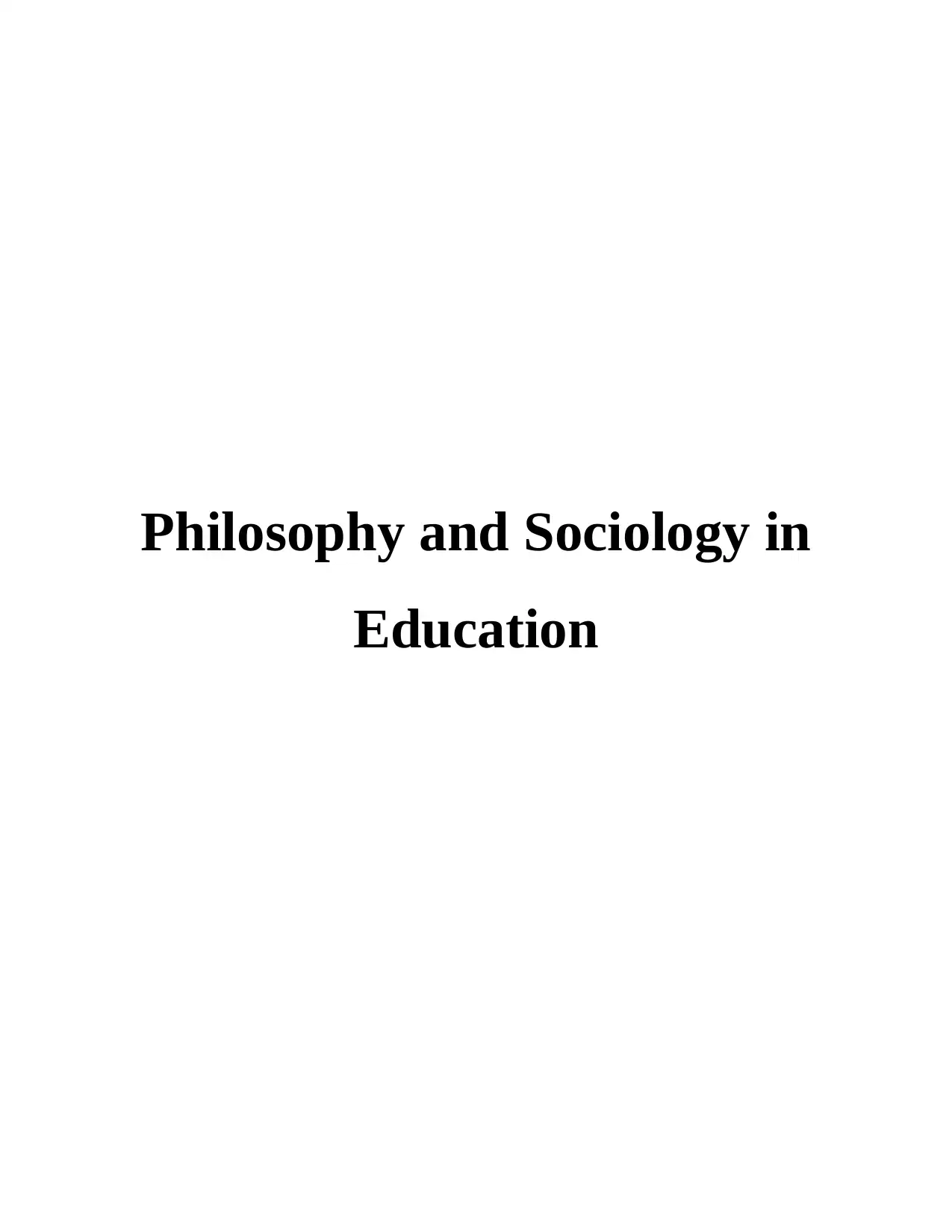
Philosophy and Sociology in
Education
Education
Paraphrase This Document
Need a fresh take? Get an instant paraphrase of this document with our AI Paraphraser
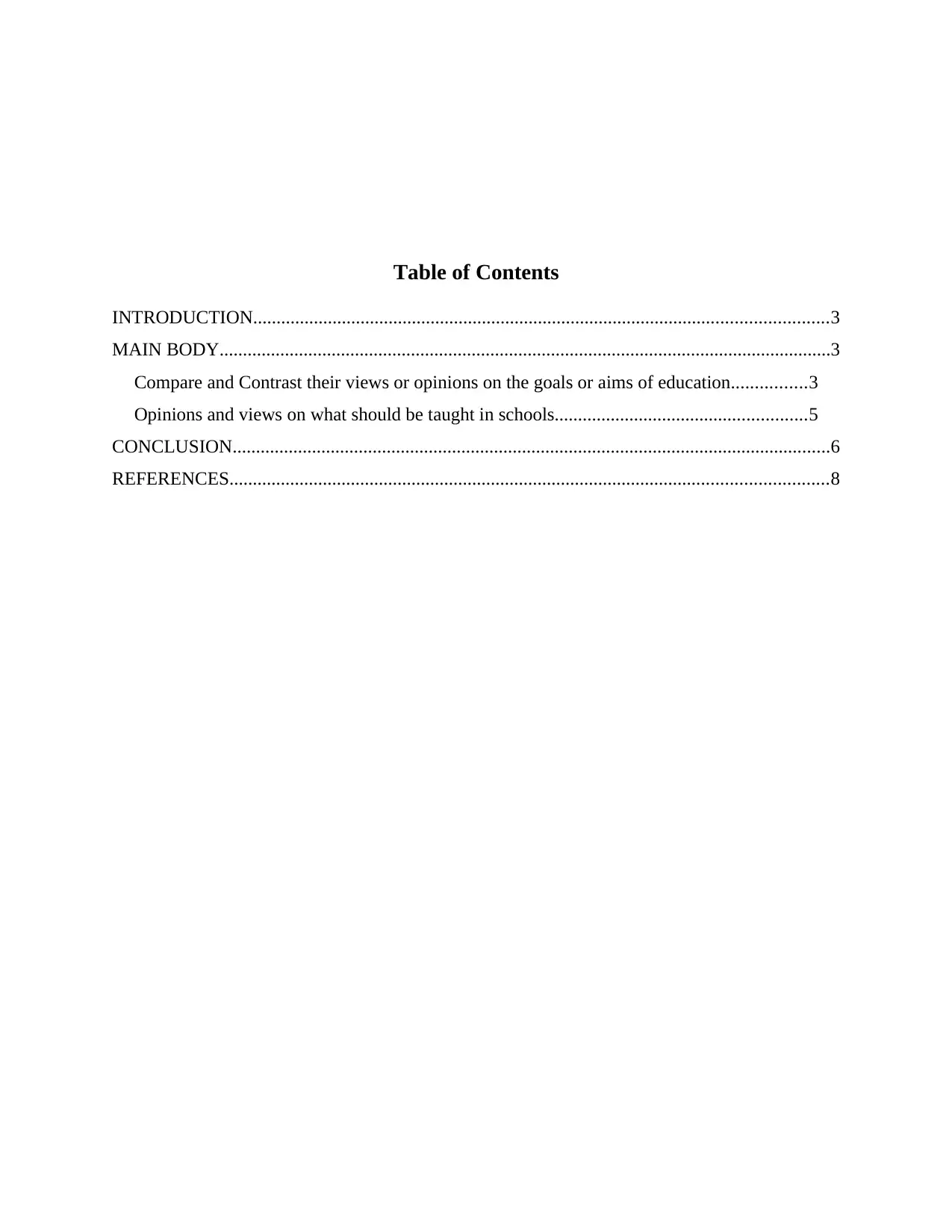
Table of Contents
INTRODUCTION...........................................................................................................................3
MAIN BODY...................................................................................................................................3
Compare and Contrast their views or opinions on the goals or aims of education................3
Opinions and views on what should be taught in schools......................................................5
CONCLUSION................................................................................................................................6
REFERENCES................................................................................................................................8
INTRODUCTION...........................................................................................................................3
MAIN BODY...................................................................................................................................3
Compare and Contrast their views or opinions on the goals or aims of education................3
Opinions and views on what should be taught in schools......................................................5
CONCLUSION................................................................................................................................6
REFERENCES................................................................................................................................8
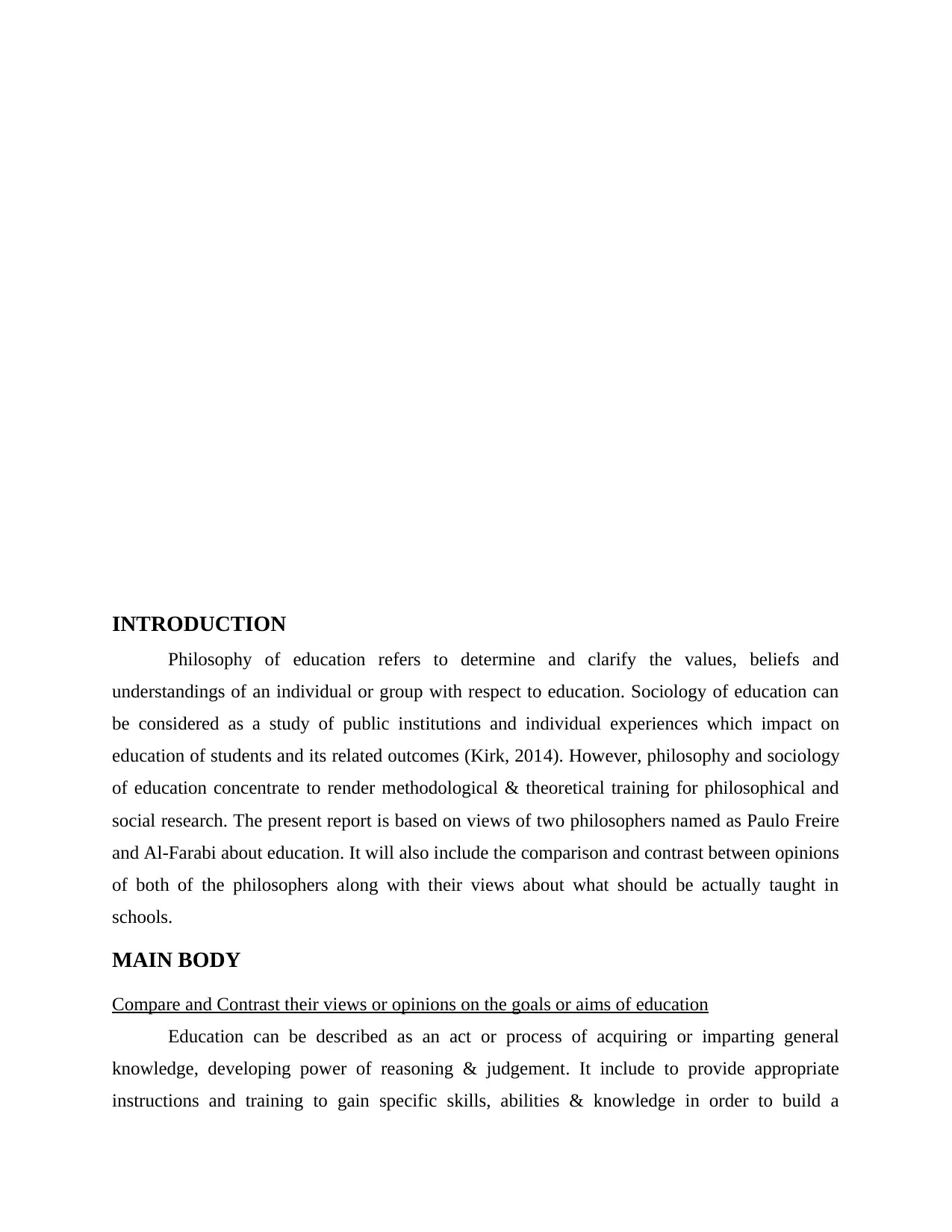
INTRODUCTION
Philosophy of education refers to determine and clarify the values, beliefs and
understandings of an individual or group with respect to education. Sociology of education can
be considered as a study of public institutions and individual experiences which impact on
education of students and its related outcomes (Kirk, 2014). However, philosophy and sociology
of education concentrate to render methodological & theoretical training for philosophical and
social research. The present report is based on views of two philosophers named as Paulo Freire
and Al-Farabi about education. It will also include the comparison and contrast between opinions
of both of the philosophers along with their views about what should be actually taught in
schools.
MAIN BODY
Compare and Contrast their views or opinions on the goals or aims of education
Education can be described as an act or process of acquiring or imparting general
knowledge, developing power of reasoning & judgement. It include to provide appropriate
instructions and training to gain specific skills, abilities & knowledge in order to build a
Philosophy of education refers to determine and clarify the values, beliefs and
understandings of an individual or group with respect to education. Sociology of education can
be considered as a study of public institutions and individual experiences which impact on
education of students and its related outcomes (Kirk, 2014). However, philosophy and sociology
of education concentrate to render methodological & theoretical training for philosophical and
social research. The present report is based on views of two philosophers named as Paulo Freire
and Al-Farabi about education. It will also include the comparison and contrast between opinions
of both of the philosophers along with their views about what should be actually taught in
schools.
MAIN BODY
Compare and Contrast their views or opinions on the goals or aims of education
Education can be described as an act or process of acquiring or imparting general
knowledge, developing power of reasoning & judgement. It include to provide appropriate
instructions and training to gain specific skills, abilities & knowledge in order to build a
⊘ This is a preview!⊘
Do you want full access?
Subscribe today to unlock all pages.

Trusted by 1+ million students worldwide
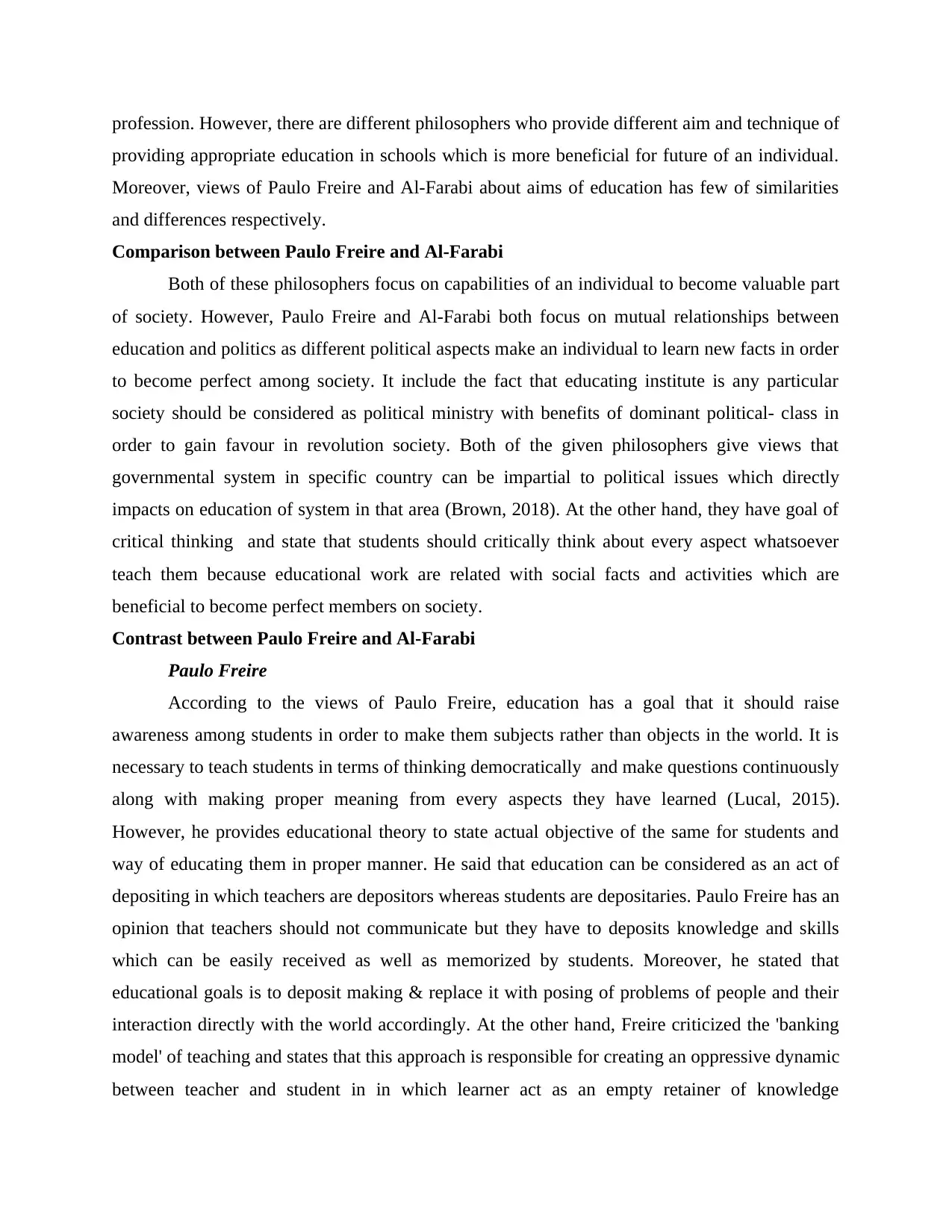
profession. However, there are different philosophers who provide different aim and technique of
providing appropriate education in schools which is more beneficial for future of an individual.
Moreover, views of Paulo Freire and Al-Farabi about aims of education has few of similarities
and differences respectively.
Comparison between Paulo Freire and Al-Farabi
Both of these philosophers focus on capabilities of an individual to become valuable part
of society. However, Paulo Freire and Al-Farabi both focus on mutual relationships between
education and politics as different political aspects make an individual to learn new facts in order
to become perfect among society. It include the fact that educating institute is any particular
society should be considered as political ministry with benefits of dominant political- class in
order to gain favour in revolution society. Both of the given philosophers give views that
governmental system in specific country can be impartial to political issues which directly
impacts on education of system in that area (Brown, 2018). At the other hand, they have goal of
critical thinking and state that students should critically think about every aspect whatsoever
teach them because educational work are related with social facts and activities which are
beneficial to become perfect members on society.
Contrast between Paulo Freire and Al-Farabi
Paulo Freire
According to the views of Paulo Freire, education has a goal that it should raise
awareness among students in order to make them subjects rather than objects in the world. It is
necessary to teach students in terms of thinking democratically and make questions continuously
along with making proper meaning from every aspects they have learned (Lucal, 2015).
However, he provides educational theory to state actual objective of the same for students and
way of educating them in proper manner. He said that education can be considered as an act of
depositing in which teachers are depositors whereas students are depositaries. Paulo Freire has an
opinion that teachers should not communicate but they have to deposits knowledge and skills
which can be easily received as well as memorized by students. Moreover, he stated that
educational goals is to deposit making & replace it with posing of problems of people and their
interaction directly with the world accordingly. At the other hand, Freire criticized the 'banking
model' of teaching and states that this approach is responsible for creating an oppressive dynamic
between teacher and student in in which learner act as an empty retainer of knowledge
providing appropriate education in schools which is more beneficial for future of an individual.
Moreover, views of Paulo Freire and Al-Farabi about aims of education has few of similarities
and differences respectively.
Comparison between Paulo Freire and Al-Farabi
Both of these philosophers focus on capabilities of an individual to become valuable part
of society. However, Paulo Freire and Al-Farabi both focus on mutual relationships between
education and politics as different political aspects make an individual to learn new facts in order
to become perfect among society. It include the fact that educating institute is any particular
society should be considered as political ministry with benefits of dominant political- class in
order to gain favour in revolution society. Both of the given philosophers give views that
governmental system in specific country can be impartial to political issues which directly
impacts on education of system in that area (Brown, 2018). At the other hand, they have goal of
critical thinking and state that students should critically think about every aspect whatsoever
teach them because educational work are related with social facts and activities which are
beneficial to become perfect members on society.
Contrast between Paulo Freire and Al-Farabi
Paulo Freire
According to the views of Paulo Freire, education has a goal that it should raise
awareness among students in order to make them subjects rather than objects in the world. It is
necessary to teach students in terms of thinking democratically and make questions continuously
along with making proper meaning from every aspects they have learned (Lucal, 2015).
However, he provides educational theory to state actual objective of the same for students and
way of educating them in proper manner. He said that education can be considered as an act of
depositing in which teachers are depositors whereas students are depositaries. Paulo Freire has an
opinion that teachers should not communicate but they have to deposits knowledge and skills
which can be easily received as well as memorized by students. Moreover, he stated that
educational goals is to deposit making & replace it with posing of problems of people and their
interaction directly with the world accordingly. At the other hand, Freire criticized the 'banking
model' of teaching and states that this approach is responsible for creating an oppressive dynamic
between teacher and student in in which learner act as an empty retainer of knowledge
Paraphrase This Document
Need a fresh take? Get an instant paraphrase of this document with our AI Paraphraser
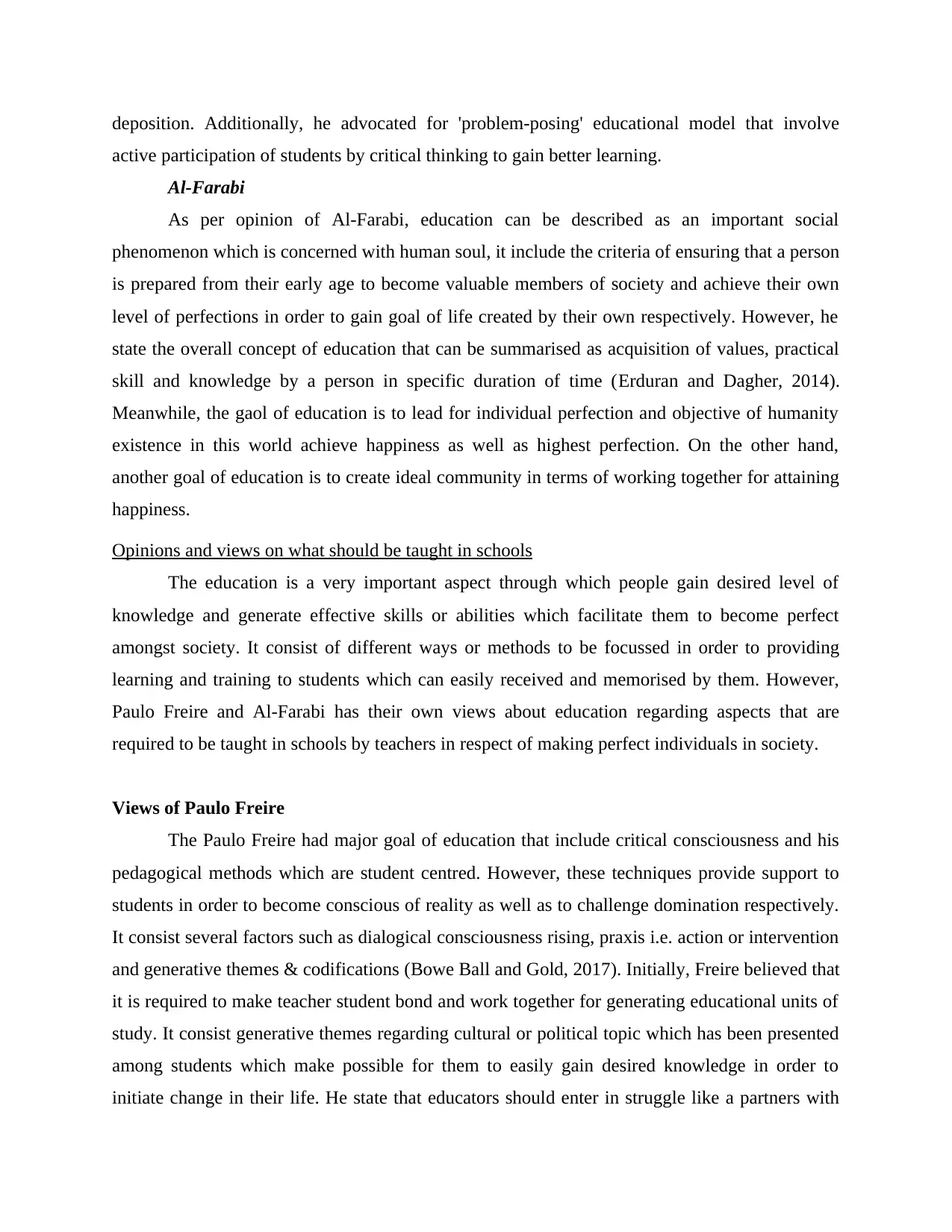
deposition. Additionally, he advocated for 'problem-posing' educational model that involve
active participation of students by critical thinking to gain better learning.
Al-Farabi
As per opinion of Al-Farabi, education can be described as an important social
phenomenon which is concerned with human soul, it include the criteria of ensuring that a person
is prepared from their early age to become valuable members of society and achieve their own
level of perfections in order to gain goal of life created by their own respectively. However, he
state the overall concept of education that can be summarised as acquisition of values, practical
skill and knowledge by a person in specific duration of time (Erduran and Dagher, 2014).
Meanwhile, the gaol of education is to lead for individual perfection and objective of humanity
existence in this world achieve happiness as well as highest perfection. On the other hand,
another goal of education is to create ideal community in terms of working together for attaining
happiness.
Opinions and views on what should be taught in schools
The education is a very important aspect through which people gain desired level of
knowledge and generate effective skills or abilities which facilitate them to become perfect
amongst society. It consist of different ways or methods to be focussed in order to providing
learning and training to students which can easily received and memorised by them. However,
Paulo Freire and Al-Farabi has their own views about education regarding aspects that are
required to be taught in schools by teachers in respect of making perfect individuals in society.
Views of Paulo Freire
The Paulo Freire had major goal of education that include critical consciousness and his
pedagogical methods which are student centred. However, these techniques provide support to
students in order to become conscious of reality as well as to challenge domination respectively.
It consist several factors such as dialogical consciousness rising, praxis i.e. action or intervention
and generative themes & codifications (Bowe Ball and Gold, 2017). Initially, Freire believed that
it is required to make teacher student bond and work together for generating educational units of
study. It consist generative themes regarding cultural or political topic which has been presented
among students which make possible for them to easily gain desired knowledge in order to
initiate change in their life. He state that educators should enter in struggle like a partners with
active participation of students by critical thinking to gain better learning.
Al-Farabi
As per opinion of Al-Farabi, education can be described as an important social
phenomenon which is concerned with human soul, it include the criteria of ensuring that a person
is prepared from their early age to become valuable members of society and achieve their own
level of perfections in order to gain goal of life created by their own respectively. However, he
state the overall concept of education that can be summarised as acquisition of values, practical
skill and knowledge by a person in specific duration of time (Erduran and Dagher, 2014).
Meanwhile, the gaol of education is to lead for individual perfection and objective of humanity
existence in this world achieve happiness as well as highest perfection. On the other hand,
another goal of education is to create ideal community in terms of working together for attaining
happiness.
Opinions and views on what should be taught in schools
The education is a very important aspect through which people gain desired level of
knowledge and generate effective skills or abilities which facilitate them to become perfect
amongst society. It consist of different ways or methods to be focussed in order to providing
learning and training to students which can easily received and memorised by them. However,
Paulo Freire and Al-Farabi has their own views about education regarding aspects that are
required to be taught in schools by teachers in respect of making perfect individuals in society.
Views of Paulo Freire
The Paulo Freire had major goal of education that include critical consciousness and his
pedagogical methods which are student centred. However, these techniques provide support to
students in order to become conscious of reality as well as to challenge domination respectively.
It consist several factors such as dialogical consciousness rising, praxis i.e. action or intervention
and generative themes & codifications (Bowe Ball and Gold, 2017). Initially, Freire believed that
it is required to make teacher student bond and work together for generating educational units of
study. It consist generative themes regarding cultural or political topic which has been presented
among students which make possible for them to easily gain desired knowledge in order to
initiate change in their life. He state that educators should enter in struggle like a partners with
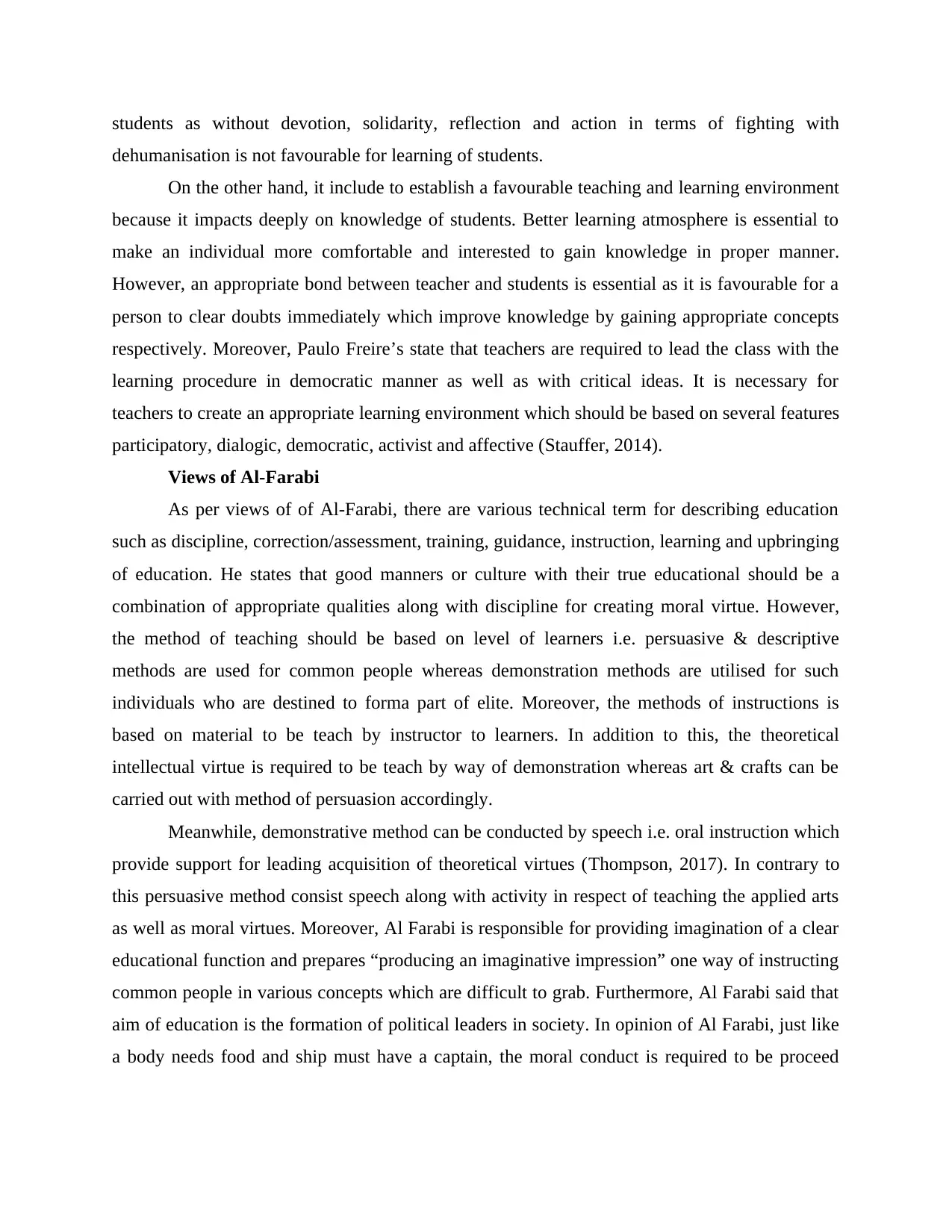
students as without devotion, solidarity, reflection and action in terms of fighting with
dehumanisation is not favourable for learning of students.
On the other hand, it include to establish a favourable teaching and learning environment
because it impacts deeply on knowledge of students. Better learning atmosphere is essential to
make an individual more comfortable and interested to gain knowledge in proper manner.
However, an appropriate bond between teacher and students is essential as it is favourable for a
person to clear doubts immediately which improve knowledge by gaining appropriate concepts
respectively. Moreover, Paulo Freire’s state that teachers are required to lead the class with the
learning procedure in democratic manner as well as with critical ideas. It is necessary for
teachers to create an appropriate learning environment which should be based on several features
participatory, dialogic, democratic, activist and affective (Stauffer, 2014).
Views of Al-Farabi
As per views of of Al-Farabi, there are various technical term for describing education
such as discipline, correction/assessment, training, guidance, instruction, learning and upbringing
of education. He states that good manners or culture with their true educational should be a
combination of appropriate qualities along with discipline for creating moral virtue. However,
the method of teaching should be based on level of learners i.e. persuasive & descriptive
methods are used for common people whereas demonstration methods are utilised for such
individuals who are destined to forma part of elite. Moreover, the methods of instructions is
based on material to be teach by instructor to learners. In addition to this, the theoretical
intellectual virtue is required to be teach by way of demonstration whereas art & crafts can be
carried out with method of persuasion accordingly.
Meanwhile, demonstrative method can be conducted by speech i.e. oral instruction which
provide support for leading acquisition of theoretical virtues (Thompson, 2017). In contrary to
this persuasive method consist speech along with activity in respect of teaching the applied arts
as well as moral virtues. Moreover, Al Farabi is responsible for providing imagination of a clear
educational function and prepares “producing an imaginative impression” one way of instructing
common people in various concepts which are difficult to grab. Furthermore, Al Farabi said that
aim of education is the formation of political leaders in society. In opinion of Al Farabi, just like
a body needs food and ship must have a captain, the moral conduct is required to be proceed
dehumanisation is not favourable for learning of students.
On the other hand, it include to establish a favourable teaching and learning environment
because it impacts deeply on knowledge of students. Better learning atmosphere is essential to
make an individual more comfortable and interested to gain knowledge in proper manner.
However, an appropriate bond between teacher and students is essential as it is favourable for a
person to clear doubts immediately which improve knowledge by gaining appropriate concepts
respectively. Moreover, Paulo Freire’s state that teachers are required to lead the class with the
learning procedure in democratic manner as well as with critical ideas. It is necessary for
teachers to create an appropriate learning environment which should be based on several features
participatory, dialogic, democratic, activist and affective (Stauffer, 2014).
Views of Al-Farabi
As per views of of Al-Farabi, there are various technical term for describing education
such as discipline, correction/assessment, training, guidance, instruction, learning and upbringing
of education. He states that good manners or culture with their true educational should be a
combination of appropriate qualities along with discipline for creating moral virtue. However,
the method of teaching should be based on level of learners i.e. persuasive & descriptive
methods are used for common people whereas demonstration methods are utilised for such
individuals who are destined to forma part of elite. Moreover, the methods of instructions is
based on material to be teach by instructor to learners. In addition to this, the theoretical
intellectual virtue is required to be teach by way of demonstration whereas art & crafts can be
carried out with method of persuasion accordingly.
Meanwhile, demonstrative method can be conducted by speech i.e. oral instruction which
provide support for leading acquisition of theoretical virtues (Thompson, 2017). In contrary to
this persuasive method consist speech along with activity in respect of teaching the applied arts
as well as moral virtues. Moreover, Al Farabi is responsible for providing imagination of a clear
educational function and prepares “producing an imaginative impression” one way of instructing
common people in various concepts which are difficult to grab. Furthermore, Al Farabi said that
aim of education is the formation of political leaders in society. In opinion of Al Farabi, just like
a body needs food and ship must have a captain, the moral conduct is required to be proceed
⊘ This is a preview!⊘
Do you want full access?
Subscribe today to unlock all pages.

Trusted by 1+ million students worldwide
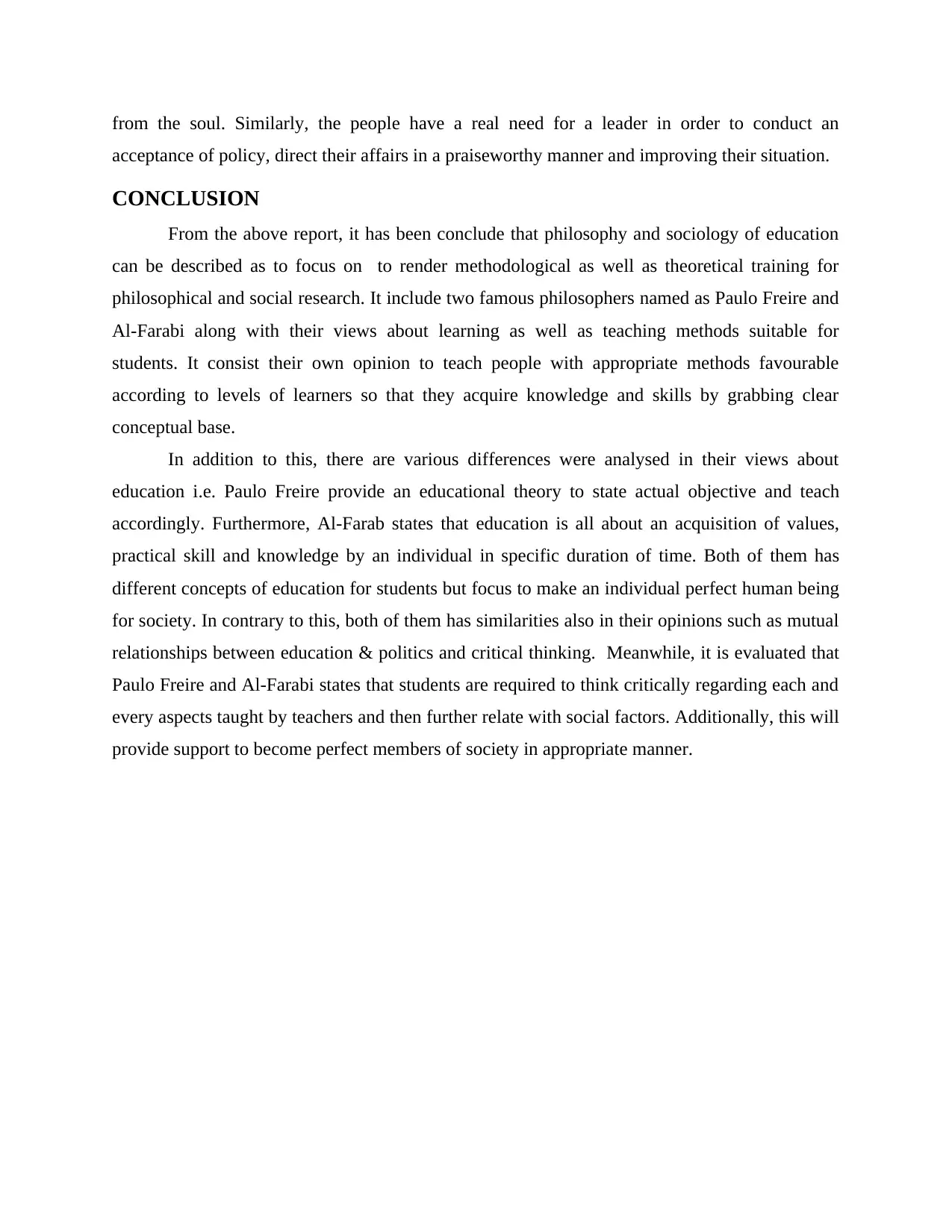
from the soul. Similarly, the people have a real need for a leader in order to conduct an
acceptance of policy, direct their affairs in a praiseworthy manner and improving their situation.
CONCLUSION
From the above report, it has been conclude that philosophy and sociology of education
can be described as to focus on to render methodological as well as theoretical training for
philosophical and social research. It include two famous philosophers named as Paulo Freire and
Al-Farabi along with their views about learning as well as teaching methods suitable for
students. It consist their own opinion to teach people with appropriate methods favourable
according to levels of learners so that they acquire knowledge and skills by grabbing clear
conceptual base.
In addition to this, there are various differences were analysed in their views about
education i.e. Paulo Freire provide an educational theory to state actual objective and teach
accordingly. Furthermore, Al-Farab states that education is all about an acquisition of values,
practical skill and knowledge by an individual in specific duration of time. Both of them has
different concepts of education for students but focus to make an individual perfect human being
for society. In contrary to this, both of them has similarities also in their opinions such as mutual
relationships between education & politics and critical thinking. Meanwhile, it is evaluated that
Paulo Freire and Al-Farabi states that students are required to think critically regarding each and
every aspects taught by teachers and then further relate with social factors. Additionally, this will
provide support to become perfect members of society in appropriate manner.
acceptance of policy, direct their affairs in a praiseworthy manner and improving their situation.
CONCLUSION
From the above report, it has been conclude that philosophy and sociology of education
can be described as to focus on to render methodological as well as theoretical training for
philosophical and social research. It include two famous philosophers named as Paulo Freire and
Al-Farabi along with their views about learning as well as teaching methods suitable for
students. It consist their own opinion to teach people with appropriate methods favourable
according to levels of learners so that they acquire knowledge and skills by grabbing clear
conceptual base.
In addition to this, there are various differences were analysed in their views about
education i.e. Paulo Freire provide an educational theory to state actual objective and teach
accordingly. Furthermore, Al-Farab states that education is all about an acquisition of values,
practical skill and knowledge by an individual in specific duration of time. Both of them has
different concepts of education for students but focus to make an individual perfect human being
for society. In contrary to this, both of them has similarities also in their opinions such as mutual
relationships between education & politics and critical thinking. Meanwhile, it is evaluated that
Paulo Freire and Al-Farabi states that students are required to think critically regarding each and
every aspects taught by teachers and then further relate with social factors. Additionally, this will
provide support to become perfect members of society in appropriate manner.
Paraphrase This Document
Need a fresh take? Get an instant paraphrase of this document with our AI Paraphraser
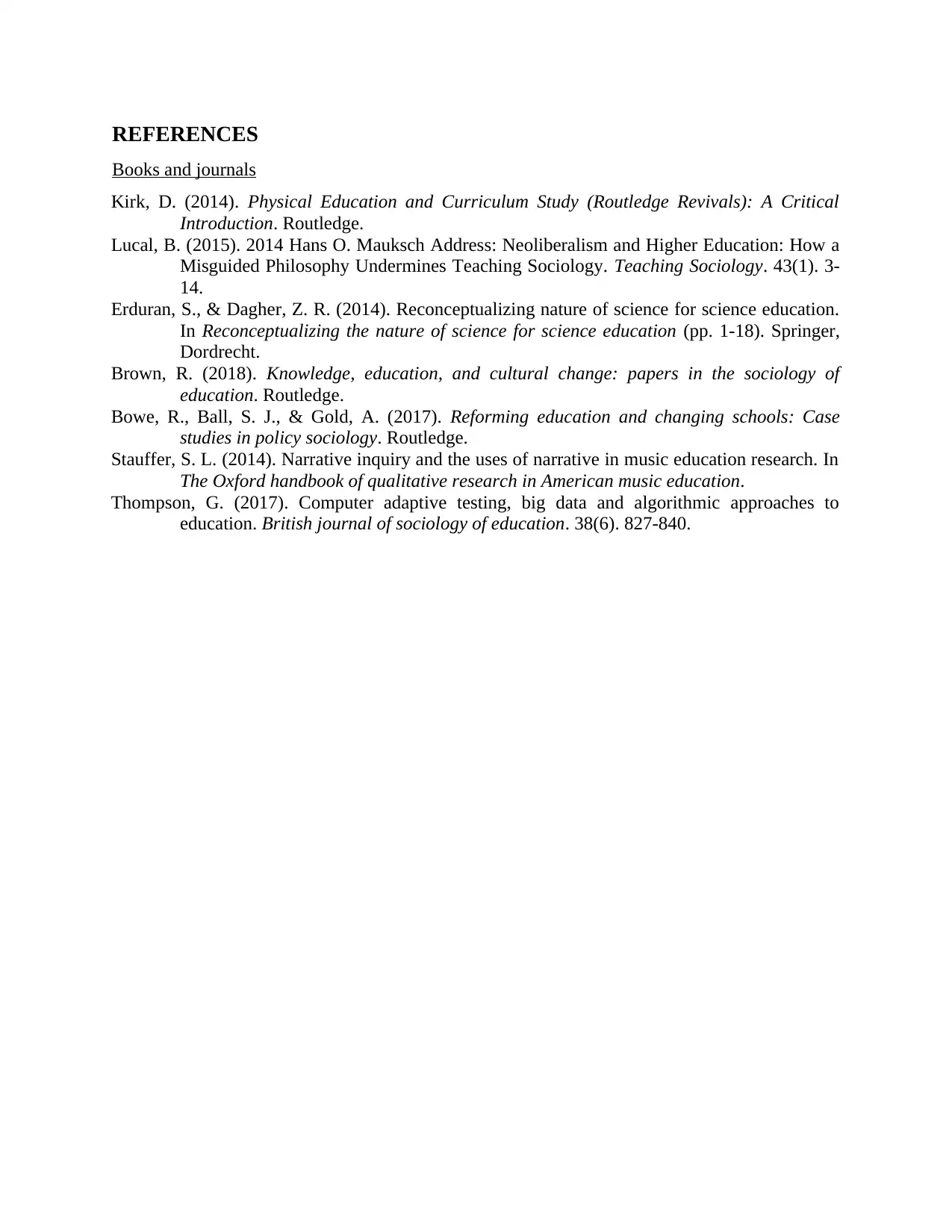
REFERENCES
Books and journals
Kirk, D. (2014). Physical Education and Curriculum Study (Routledge Revivals): A Critical
Introduction. Routledge.
Lucal, B. (2015). 2014 Hans O. Mauksch Address: Neoliberalism and Higher Education: How a
Misguided Philosophy Undermines Teaching Sociology. Teaching Sociology. 43(1). 3-
14.
Erduran, S., & Dagher, Z. R. (2014). Reconceptualizing nature of science for science education.
In Reconceptualizing the nature of science for science education (pp. 1-18). Springer,
Dordrecht.
Brown, R. (2018). Knowledge, education, and cultural change: papers in the sociology of
education. Routledge.
Bowe, R., Ball, S. J., & Gold, A. (2017). Reforming education and changing schools: Case
studies in policy sociology. Routledge.
Stauffer, S. L. (2014). Narrative inquiry and the uses of narrative in music education research. In
The Oxford handbook of qualitative research in American music education.
Thompson, G. (2017). Computer adaptive testing, big data and algorithmic approaches to
education. British journal of sociology of education. 38(6). 827-840.
Books and journals
Kirk, D. (2014). Physical Education and Curriculum Study (Routledge Revivals): A Critical
Introduction. Routledge.
Lucal, B. (2015). 2014 Hans O. Mauksch Address: Neoliberalism and Higher Education: How a
Misguided Philosophy Undermines Teaching Sociology. Teaching Sociology. 43(1). 3-
14.
Erduran, S., & Dagher, Z. R. (2014). Reconceptualizing nature of science for science education.
In Reconceptualizing the nature of science for science education (pp. 1-18). Springer,
Dordrecht.
Brown, R. (2018). Knowledge, education, and cultural change: papers in the sociology of
education. Routledge.
Bowe, R., Ball, S. J., & Gold, A. (2017). Reforming education and changing schools: Case
studies in policy sociology. Routledge.
Stauffer, S. L. (2014). Narrative inquiry and the uses of narrative in music education research. In
The Oxford handbook of qualitative research in American music education.
Thompson, G. (2017). Computer adaptive testing, big data and algorithmic approaches to
education. British journal of sociology of education. 38(6). 827-840.
1 out of 8
Related Documents
Your All-in-One AI-Powered Toolkit for Academic Success.
+13062052269
info@desklib.com
Available 24*7 on WhatsApp / Email
![[object Object]](/_next/static/media/star-bottom.7253800d.svg)
Unlock your academic potential
Copyright © 2020–2026 A2Z Services. All Rights Reserved. Developed and managed by ZUCOL.





